THE FBA SDNY CHAPTER UNITED NATIONS REPORTER SERIES
By Clara Bergnier1
FBA UN Reporter
November 4, 2019
“We need to uphold the equal rights, voices and influence of girls in our families, communities and nations. Girls can be powerful agents of change, and nothing should keep them from participating fully in all areas of life.” — UN Secretary-General António Guterres
Since 2012, October 11th has been celebrated as the International Day of the Girl. This year, the 8th Annual Girls Speak Out was held at the United Nations under the theme of “Girl Force: Unscripted and Unstoppable.” Remarkably, the discussion was led by young girls and teenagers who came from all over the world to tell the story of hundreds of girls, all suffering from different kinds of discrimination. The goal was to promote awareness, prompt change, and gain the support of world leaders.
Sophia, a member of one of the First Nations in New Brunswick, Canada, opened the discussion by expressing deep gratitude to the Lenape people, explaining how their land and water supported the people gathered there today. “This acknowledgement is a first step to understanding that we are all visitors on this territory we call New York City and that it was a surrounded land,” she said. The session’s introduction was closed by Amina Mohammed, Deputy Secretary General of the United Nations, who emphasized how the International Day of the Girl celebrates the talents and dreams of girls from all over the world. She named all the participants and acknowledged how remarkable and strong they are. “You’re creative and compassionate, you’re sassy and you’re certainly very smart,” said Ms. Mohammed. Ms. Mohammed framed this celebration as the culmination of all the achievements made in favor of girls since 1995, at the World Conference on Women held in Beijing, China. In the past 25 years, landmark progress has been observed, but there is still a long way to go. Ms. Mohammed notably explained that, each year, 12 million girls under 18 years old are married, 130 million are not permitted to attend school, and millions suffer from violence. “This is outrageous and unacceptable,” stated Ms. Mohammed.
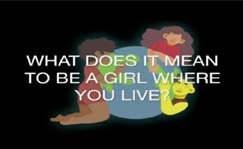
At the conference, a key question posed to the group was: “What does it mean to be a girl where you live?” The young girls and teenagers conducting the session showed the audience a clip featuring girls answering this question. The answers differed from country to country, but mostly emphasized a lack of respect and a need to fight very hard in order to be considered and to be taken seriously. Pressure, assault, forced marriage, and no access to education were the common themes. Notwithstanding these difficulties, positivism, courage, and empowerment, along with smiles, were at the heart of those answers.
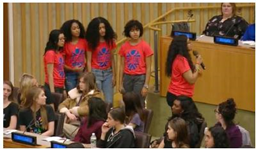
In order to dive more deeply into the question, the young activists, walking all around the room, answered in turn the question “what it is to be a girl.” They quoted dozens of girls who say, “I stay quiet because girls don’t raise a voice.” Dreams and passion for certain fields were also mentioned as difficult to access, notably the Science, Technology, Engineering, and Mathematics (STEM) fields. “In a nutshell, being a girl is being assaulted, abused, neglected, judged. But pretending to be fine and perfect simultaneously is what is being a girl in today’s world.” Emilie, leading the session, emphasized the global support girls need, and recommended solutions on how to make this possible. She mentioned the need to foster an environment of dignity and respect between youth leaders; the need to create safe spaces for girls to talk about their experiences and their skills and to develop strong intergenerational partnerships; the need for governments and community leaders to empower women in leadership positions; and the need to support one another, whatever the society tells you. “Girls CAN and DO lead,” she claimed.
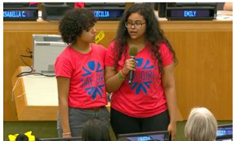
The session continued, following a recurrent pattern: a small group of girls walking around the room and sharing stories of girls from all over the world. This very engaging way to tell stories and present issues was followed by a short speech by some of the main speaker-activists, and their speech was answered and supported by a member of the audience, usually an ambassador or a UN leader.

Isabella C., an immigration rights activist, introduced the issue concerning the immigration process in the U.S., largely affecting mothers and daughters. Sexual abuse and separation, as well as dehumanization, have to be recognized and stopped, she explained. Isabella M., a gender-based violence activist, talked about indigenous girls and stated that, in the U.S., 84% of indigenous girls will experience violence in their lifetime and 95% of those cases go undocumented by national media.

Rose, a girl’s education activist, explained the challenges black and brown girls encounter every day at school in the U.S., and also elsewhere. She described schools as an “overly sexualized” environment, discriminating against black and brown girls. She stated that, in New York City, black and brown girls are ten times more likely to be disciplined than other girls. Cecilia, a girl’s health and sanitation activist, introduced the issue concerning the lack of sanitation that affects girls in the Southern part of Africa. She cited the most important issues as being teenage pregnancy; Sexually Transmitted Infections (“STIs”); HIV/AIDS; and lack of sexual protective information. She called for the construction of centers within schools, dedicated to addressing those issues. Finally, Sophia, a climate and land activist, explained how indigenous girls struggle to grow up in a healthy community, where they are sometimes forced to be relocated.
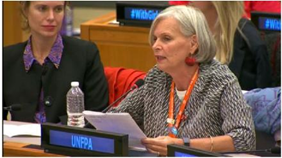
The audience’s response to the teenage girls’ statements was supportive and hopeful. By way of example, Ms. Anneka Knutsson, Chief, Sexual and Reproductive Health Branch of United Nations Population Fund (UNFPA), recognized the extremely difficult situation young girls face and the suffering they endure during migration. Migration brings risks and opportunities, she explained. Unfortunately, young girls, escaping violence and aspiring to a better future, encounter terrible experiences in the process. Ms. Knutsson talked about a triple jeopardy: being young, migrant, and female. “Your struggle is our struggle,” she said.
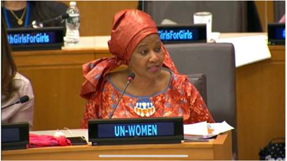
Dr. Phumzile Mlambo-Ngcuka, Under-Secretary General and UN Women Executive Director, praised the establishment of platforms in order to help young girls express themselves. Talking about the 25th anniversary of the World Conference on Women next year, she emphasized the need to improve gender-equality, most notably as regards education, which is a basic human right. She said: “The beauty of being a girl is that there’s a lot of you. Cute as anything. Strong as anything. Clever as anything. … Out of the 1.8 billion young people in the world, 900 million of them are teenage girls. That’s a lot of girls!”
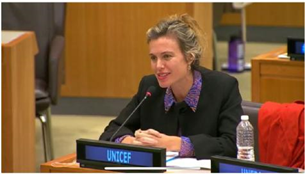
Lauren Rumble, Principal Advisor for Gender and Development at UNICEF, pointed that “[u]nfortunately, the data tells us that no matter where you grow up, life is worse if you’re a girl.” One out of five girls is still out of school, and girls see their options limited because of those norms telling them what they should be and what they should do. Ms. Rumble wants to see more resources for girls and more girls influencing decisions. This responsibility for change should not rest heavily on young activists’ shoulders, but on duty bearers to take actions, she explained. Following each leader’s answer, the teenage girls called out the name of the girl who had previously spoken, chanting: “We are for (Rose)! We are with (Rose)!”
Concluding the session, the young activists said that they hope people understood what it will take to achieve equality for girls. They called on the help of UN leaders and allies, explaining they can’t do that alone. “The only way to achieve these goals is by working with girls, for girls,” said Emilie. In fact, it’s been almost 25 years since the first focus on the “girl-child,” and decision-makers and UN officials have yet to actualize girls’ rights. “It’s no longer enough to just mention us. Bringing girls to the table is no longer a request but a requirement,” said Clara. “We are with girls! We are for girls! I am a girl!” they said in unison.

1 Clara Bergnier is an LLM Student at Fordham Law School studying International Law and Justice. She will be graduating in Spring 2020.